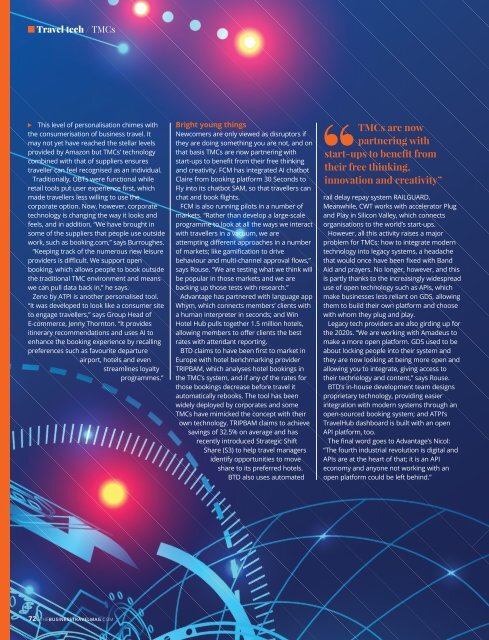Create successful ePaper yourself
Turn your PDF publications into a flip-book with our unique Google optimized e-Paper software.
<strong>Travel</strong> tech / TMCs<br />
This level of personalisation chimes with<br />
the consumerisation of business travel. It<br />
may not yet have reached the stellar levels<br />
provided by Amazon but TMCs’ technology<br />
combined with that of suppliers ensures<br />
traveller can feel recognised as an individual.<br />
Traditionally, OBTs were functional while<br />
retail tools put user experience first, which<br />
made travellers less willing to use the<br />
corporate option. Now, however, corporate<br />
technology is changing the way it looks and<br />
feels, and in addition, “We have brought in<br />
some of the suppliers that people use outside<br />
work, such as booking.com,” says Burroughes.<br />
“Keeping track of the numerous new leisure<br />
providers is difficult. We support open<br />
booking, which allows people to book outside<br />
the traditional TMC environment and means<br />
we can pull data back in,” he says.<br />
Zeno by ATPI is another personalised tool.<br />
“It was developed to look like a consumer site<br />
to engage travellers,” says Group Head of<br />
E-commerce, Jenny Thornton. “It provides<br />
itinerary recommendations and uses AI to<br />
enhance the booking experience by recalling<br />
preferences such as favourite departure<br />
airport, hotels and even<br />
streamlines loyalty<br />
programmes.”<br />
Bright young things<br />
Newcomers are only viewed as disruptors if<br />
they are doing something you are not, and on<br />
that basis TMCs are now partnering with<br />
start-ups to benefit from their free thinking<br />
and creativity. FCM has integrated AI chatbot<br />
Claire from booking platform 30 Seconds to<br />
Fly into its chatbot SAM, so that travellers can<br />
chat and book flights.<br />
FCM is also running pilots in a number of<br />
markets. “Rather than develop a large-scale<br />
programme to look at all the ways we interact<br />
with travellers in a vacuum, we are<br />
attempting different approaches in a number<br />
of markets; like gamification to drive<br />
behaviour and multi-channel approval flows,”<br />
says Rouse. “We are testing what we think will<br />
be popular in those markets and we are<br />
backing up those tests with research.”<br />
Advantage has partnered with language app<br />
Whym, which connects members’ clients with<br />
a human interpreter in seconds; and Win<br />
Hotel Hub pulls together 1.5 million hotels,<br />
allowing members to offer clients the best<br />
rates with attendant reporting.<br />
BTD claims to have been first to market in<br />
Europe with hotel benchmarking provider<br />
TRIPBAM, which analyses hotel bookings in<br />
the TMC’s system, and if any of the rates for<br />
those bookings decrease before travel it<br />
automatically rebooks. <strong>The</strong> tool has been<br />
widely deployed by corporates and some<br />
TMCs have mimicked the concept with their<br />
own technology. TRIPBAM claims to achieve<br />
savings of 32.5% on average and has<br />
recently introduced Strategic Shift<br />
Share (S3) to help travel managers<br />
identify opportunities to move<br />
share to its preferred hotels.<br />
BTD also uses automated<br />
TMCs are now<br />
partnering with<br />
start-ups to benefit from<br />
their free thinking,<br />
innovation and creativity”<br />
rail delay repay system RAILGUARD.<br />
Meanwhile, CWT works with accelerator Plug<br />
and Play in Silicon Valley, which connects<br />
organisations to the world’s start-ups.<br />
However, all this activity raises a major<br />
problem for TMCs: how to integrate modern<br />
technology into legacy systems, a headache<br />
that would once have been fixed with Band<br />
Aid and prayers. No longer, however, and this<br />
is partly thanks to the increasingly widespread<br />
use of open technology such as APIs, which<br />
make businesses less reliant on GDS, allowing<br />
them to build their own platform and choose<br />
with whom they plug and play.<br />
Legacy tech providers are also girding up for<br />
the 2020s. “We are working with Amadeus to<br />
make a more open platform. GDS used to be<br />
about locking people into their system and<br />
they are now looking at being more open and<br />
allowing you to integrate, giving access to<br />
their technology and content,” says Rouse.<br />
BTD’s in-house development team designs<br />
proprietary technology, providing easier<br />
integration with modern systems through an<br />
open-sourced booking system; and ATPI’s<br />
<strong>Travel</strong>Hub dashboard is built with an open<br />
API platform, too.<br />
<strong>The</strong> final word goes to Advantage’s Nicol:<br />
“<strong>The</strong> fourth industrial revolution is digital and<br />
APIs are at the heart of that; it is an API<br />
economy and anyone not working with an<br />
open platform could be left behind.”<br />
72 THEBUSINESSTRAVELMAG.COM

















